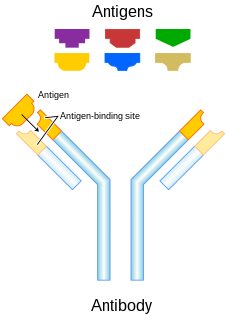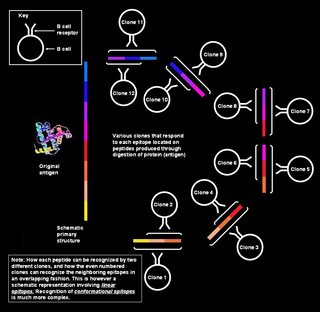
In immunology, an antigen (Ag) is a molecule or molecular structure, such as may be present on the outside of a pathogen, that can be bound by an antigen-specific antibody or B-cell antigen receptor. The presence of antigens in the body normally triggers an immune response. The Ag abbreviation stands for an antibody generator.
Autoimmunity is the system of immune responses of an organism against its own healthy cells, tissues and other body normal constituents. Any disease that results from such an aberrant immune response is termed an "autoimmune disease". Prominent examples include celiac disease, post-infectious IBS, diabetes mellitus type 1, Henloch Scholein Pupura (HSP) sarcoidosis, systemic lupus erythematosus (SLE), Sjögren syndrome, eosinophilic granulomatosis with polyangiitis, Hashimoto's thyroiditis, Graves' disease, idiopathic thrombocytopenic purpura, Addison's disease, rheumatoid arthritis (RA), ankylosing spondylitis, polymyositis (PM), dermatomyositis (DM) and multiple sclerosis (MS). Autoimmune diseases are very often treated with steroids.

The major histocompatibility complex (MHC) is a large locus on vertebrate DNA containing a set of closely linked polymorphic genes that code for cell surface proteins essential for the adaptive immune system. These cell surface proteins are called MHC molecules.
The National Institute of Allergy and Infectious Diseases (NIAID) is one of the 27 institutes and centers that make up the National Institutes of Health (NIH), an agency of the United States Department of Health and Human Services (HHS). NIAID's mission is to conduct basic and applied research to better understand, treat, and prevent infectious, immunologic, and allergic diseases.

The Biocomplexity Institute of Virginia Tech is a research organization specializing in bioinformatics, computational biology, and systems biology. The Institute has more than 250 personnel, including over 50 tenured and research faculty. Research at the Institute involves collaboration in diverse disciplines such as mathematics, computer science, biology, plant pathology, biochemistry, systems biology, statistics, economics, synthetic biology and medicine. The institute develops -omic and bioinformatic tools and databases that can be applied to the study of human, animal and plant diseases as well as the discovery of new vaccine, drug and diagnostic targets.
In academia, computational immunology is a field of science that encompasses high-throughput genomic and bioinformatics approaches to immunology. The field's main aim is to convert immunological data into computational problems, solve these problems using mathematical and computational approaches and then convert these results into immunologically meaningful interpretations.
Immunogenicity is the ability of a foreign substance, such as an antigen, to provoke an immune response in the body of a human or other animal. It may be wanted or unwanted:

Polyclonal B cell response is a natural mode of immune response exhibited by the adaptive immune system of mammals. It ensures that a single antigen is recognized and attacked through its overlapping parts, called epitopes, by multiple clones of B cell.

La Jolla Institute for Immunology is a non-profit research organization located in La Jolla, California. It is located in UC San Diego’s Research Park. The Institute researches immunology and immune system diseases. The Institute employs 23 faculty members and more than 300 employees. Dr. Mitchell Kronenberg has served as its president and scientific director since 2003. The institute was founded in 1988.
The Bioinformatics Resource Centers (BRCs) are a group of five Internet-based research centers established in 2004 and funded by NIAID The BRCs were formed in response to the threats posed by emerging and re-emerging pathogens, particularly Centers for Disease Control and Prevention (CDC) Category A, B, and C pathogens, and their potential use in bioterrorism. The intention of NIAID in funding these bioinformatics centers is to assist researchers involved in the experimental characterization of such pathogens and the formation of drugs, vaccines, or diagnostic tools to combat them.
The National Microbial Pathogen Data Resource was one of the eight Bioinformatics Resource Centers funded by the National Institutes of Allergy and Infectious Diseases, NIAID a component of the National Institutes of Health (NIH), which is an agency of the United States Department of Health and Human Services.
Pathema was one of the eight bioinformatics resource centers funded by the National Institute of Allergy and Infectious Diseases (NIAID), a component of the National Institute of Health (NIH), which is an agency of the United States Department of Health and Human Services.
Barton Ford Haynes is an American physician and immunologist internationally recognized for work in T-cell immunology, retrovirology and HIV vaccine development. Haynes is a Frederic M. Hanes Professor of Medicine and Immunology at Duke University Medical Center. He is the director of the Duke Human Vaccine Institute and the Duke Center for HIV/AIDS Vaccine Immunology and Immunogen Discovery (CHAVI-ID), which was funded by the National Institute of Allergy and Infectious Diseases (NIAID) in 2012. In addition, Haynes directs the B-cell Lineage Envelope Design Study, the Centralized Envelope Phase I Study, and the Role of IgA in HIV-1 Protection Study as part of the Collaboration for AIDS Vaccine Discovery (CAVD), which was funded by the Bill and Melinda Gates Foundation in 2006.
PATRIC is the Bacterial Bioinformatics Resource Center, an information system designed to support the biomedical research community’s work on bacterial infectious diseases via integration of vital pathogen information with rich data and analysis tools. PATRIC sharpens and hones the scope of available bacterial phylogenomic data from numerous sources specifically for the bacterial research community, in order to save biologists time and effort when conducting comparative analyses. The freely available PATRIC platform provides an interface for biologists to discover data and information and conduct comprehensive comparative genomics and other analyses in a one-stop shop. PATRIC, a project of Virginia Tech’s Cyberinfrastructure Division, is funded by the National Institutes of Allergy and Infectious Diseases (NIAID), a component of the National Institutes of Health (NIH).
The Virus Pathogen Database and Analysis Resource (ViPR) is an integrative and comprehensive publicly available database and analysis resource to search, analyze, visualize, save and share data for viral pathogens in the U.S. National Institute of Allergy and Infectious Diseases (NIAID) Category A-C Priority Pathogen lists for biodefense research, and other viral pathogens causing emerging/reemerging infectious diseases. ViPR is one of the five Bioinformatics Resource Centers (BRC) funded by NIAID, a component of the National Institutes of Health (NIH), which is an agency of the United States Department of Health and Human Services.
The Influenza Research Database (IRD) is an integrative and comprehensive publicly available database and analysis resource to search, analyze, visualize, save and share data for influenza virus research. IRD is one of the five Bioinformatics Resource Centers (BRC) funded by the National Institute of Allergy and Infectious Diseases (NIAID), a component of the National Institutes of Health (NIH), which is an agency of the United States Department of Health and Human Services.
Immunomics is the study of immune system regulation and response to pathogens using genome-wide approaches. With the rise of genomic and proteomic technologies, scientists have been able to visualize biological networks and infer interrelationships between genes and/or proteins; recently, these technologies have been used to help better understand how the immune system functions and how it is regulated. Two thirds of the genome is active in one or more immune cell types and less than 1% of genes are uniquely expressed in a given type of cell. Therefore, it is critical that the expression patterns of these immune cell types be deciphered in the context of a network, and not as an individual, so that their roles be correctly characterized and related to one another. Defects of the immune system such as autoimmune diseases, immunodeficiency, and malignancies can benefit from genomic insights on pathological processes. For example, analyzing the systematic variation of gene expression can relate these patterns with specific diseases and gene networks important for immune functions.
The immunome is the set of genes and proteins that constitute the immune system, excluding those that are widespread in other cell types, and not involved in the immune response itself. It is further defined as the set of peptides derived from the proteome that interact with the immune system. There are numerous ongoing efforts to characterize and sequence the immunomes of humans, mice, and elements of non-human primates. Typically, immunomes are studied using immunofluorescence microscopy to determine the presence and activity of immune-related enzymes and pathways. Practical applications for studying the immunome include vaccines, therapeutic proteins, and further treatment of other diseases. The study of the immunome falls under the field of immunomics.
Alessandro Sette is an Italian immunologist. He is a professor at La Jolla Institute for Immunology (LJI). He is an adjunct professor at the University of California, San Diego. Sette studies the specific epitopes that the immune system recognizes in cancer, autoimmunity, allergy, and infectious diseases.

Catharine "Katy" Mans Bosio is an American biologist. She is a senior investigator and chief of the immunity to pulmonary pathogens section at the National Institute of Allergy and Infectious Diseases.